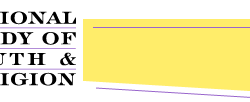|
Religious Affiliation between 1976 and 1996 View printer-friendly version [PDF] Despite noticeable shifts in religious affiliations, the total percentage of American 12th graders that claimed religious affiliation remained strong over the 20-year period from 1976 to 1996. While the overall pattern was stable, there was movement within specific traditions. The proportion of Protestant youth declined by 10 percent in that period, with Lutherans losing the largest percent of youth. This decline was also shared in other traditionally "mainline" denominations, including Methodists, Baptists, and the United Church of Christ. The proportion of Catholic youth declined very slightly, and the proportion of Jewish youth grew slightly. By contrast, although the vast majority of American youth remain within the Christian tradition, these years show a 5 percent jump in affiliation with non-Christian religious traditions. These results are from the Monitoring the Future (MTF) survey, a nationally representative survey of American high school students. Another significant finding is that despite a 5 percent increase in the proportion of young people who claim to have no religious affiliation, that total remained at less than 20 percent in 1996. This preliminary analysis is designed to provide baseline information that will aid in the development of a comprehensive survey of adolescents for the National Study of Youth and Religion, a four-year research project being conducted at The University of North Carolina at Chapel Hill under the direction of Dr. Christian Smith. Funded by Lilly Endowment, Inc., this project is designed to enhance our understanding of the religious and spiritual lives of American adolescents. Analysis of data was completed by Christian Smith, Melinda Lundquist Denton, Robert Faris, and Mark Regnerus. Christian Smith is Professor and Associate Chair of Sociology at The University of North Carolina at Chapel Hill. Melinda Lundquist Denton and Robert Faris are Ph.D. graduate students in sociology at The University of North Carolina at Chapel Hill. Mark Regnerus is Assistant Professor of Sociology and Director of the Center for Social Research at Calvin College, Grand Rapids, Mich. Monitoring the Future (MTF) is a nationally representative survey of American high school students, administered to 12th graders since 1975. By design, MTF data does not include school dropouts and home-schooled youth. The MTF survey includes two religion questions on its core questionnaire analyzed here: 1) "How often do you attend religious services?" and 2) "What is your religious preference?" Johnston, Lloyd D., Jerald G. Bachman, Patrick M. O'Malley, and John Schulenberg. MONITORING THE FUTURE: A CONTINUING STUDY OF AMERICAN YOUTH (8TH- AND 10TH-GRADE SURVEYS), 1996 [Computer file]. Conducted by University of Michigan, Survey Research Center. ICPSR ed. Ann Arbor, MI: Inter-university Consortium for Political and Social Research producer and distributor], 1999. The original collector of the data, ICPSR, and the relevant funding agency bear no responsibility for use of the data or for interpretations or inferences based upon such uses. 1-31-02 |



